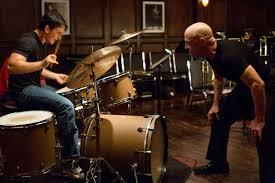 From its earliest scenes, Whiplash (2014) is unremittingly, intensely violent. Damien Chazelle, more recently of La La Land, treats music as psychological warfare, with crashing percussion and harsh instruction driving weak players to destruction.
From its earliest scenes, Whiplash (2014) is unremittingly, intensely violent. Damien Chazelle, more recently of La La Land, treats music as psychological warfare, with crashing percussion and harsh instruction driving weak players to destruction.Andrew Neiman (Miles Teller) studies music at Shaffer Conservatory. His drumming catches the eye of Terence Fletcher (J.K. Simmons), notorious conductor of a studio band. Andrew's invited to join, but finds Fletcher a cruel taskmaster who pushes the student to the brink of madness. Initially discouraged, Andrew grows increasingly obsessed with proving the conductor wrong, to the point of self-destruction.
While Whiplash borrows the familiar contours of an education or sports drama (stern teacher and overeager student butting heads), Chazelle's crushing direction makes it singularly oppressive. He employs smash cuts, searching close-ups of sweating and screaming faces, swooping long takes following Fletcher's conducting blood dripping on drums and ice, with Justin Hurwitz's jazz score driving home an intensity that's unrelenting. It's oppressive in a way that takes any joy out of the movie's oft-impressive musical stagings.
At heart, Whiplash is an intense character study, showing Andrew's tutelage under Fletcher as a descent into madness. He starts out likable, but driven by Fletcher's profane, exacting tirades he focuses on music to the detriment of everything else. He drives away his girlfriend Nicole (Melissa Benoist), baffles his father (Paul Reiser) and openly insults his fellow musicians. His devotion amounts to self-destruction, as when he walks from a car wreck to a concert, covered in blood. His gamesmanship with Fletcher allows him to become a gifted musician at the expense of humanity.
Fletcher seems easier to navigate, a loud, physically imposing monster who switches from friendly encouragement to anti-Semitic epithets and thrown chairs. His violent, single-minded obsession with music recalls a drill instructor more than a teacher or coach, unleavened by his glimmers of humanity. He pays emotional tribute to a deceased protege, which registers until it's revealed that Fletcher's responsible for his fate. Towards the end, he offers Andrew a chance at redemption that turns into a public humiliation. Andrew can only best Fletcher by being even better, and crueler than him.
Miles Teller, a fine actor often wasted in garbage, tackles Andrew's painful character arc with sharp, focused intensity. He gives an Andrew a harsh edge from the earliest scenes, only intensified by his desperate efforts at self-improvement. J.K. Simmons goes all-out, making Fletcher a savage, bellowing monster who would be a caricature if he weren't so frighteningly real. Melissa Benoist (between Glee and Supergirl) has a small, appealing role as Andrew's uncomprehending girlfriend.
In its extreme approach and crushing atmosphere, Whiplash is anything but subtle. It doesn't need to be: its sheer dramatic power and dynamic acting carries the movie.

